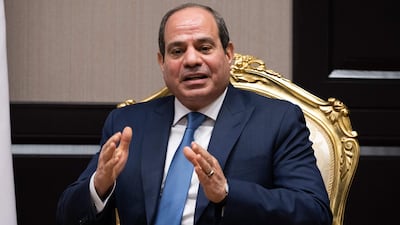Egypt’s President on Monday warned Egyptians against believing inaccurate information about the country’s worsening economic crisis, saying they should only listen to the government on the subject.
“The circumstance is very, very difficult,” President Abdel Fattah El Sisi said of the country’s economic woes, which he blamed on the Russia-Ukraine war and the coronavirus pandemic before it.
The President’s comments were made the same day that his government announced an austerity package mainly designed to address a months-old foreign currency crunch.
The measures, published in the Official Gazette, include the indefinite postponement of yet-to-start projects with a dollar component, restrictions on foreign travel by officials and suspending the import of non-essential foreign goods and materials.
The decree did not specify which projects would be shelved.
The package also includes spending cuts in local currency that include allowances for state employees, freezing participation in local conferences without prior approval and a halt to additional spending on recreational or sports activities.

“Listen to us, not because we are more truthful than others, but because we are more aware than others of the magnitude of the challenge,” Mr El Sisi said in televised comments during a ceremony for an alliance of local non-governmental agencies.
He said that while attempts by ordinary people to discover or interpret aspects of the economic crisis were not intentionally harmful, they still cause “confusion and deepen people’s alarm.”
Egypt has been awash with rumours, some spread on social media, about the economic situation and what Mr El Sisi and his government are doing to steer the country of 104 million people out of it.
Chief among these was an unfounded rumour about the wholesale privatisation of state assets, including the Suez Canal, the strategic waterway that is a revered symbol of Egypt’s anti-colonial struggle.
Others speak of widespread graft and the uselessness of some of new major infrastructure projects that are being personally supervised by Mr El Sisi.
“Did we enter a war in which we squandered the state’s money? Did we embark on adventures in which we used the state’s money? Enough with the nonsense, already,” Mr El Sisi said.

The notion of state funds being wasted on “adventures” is often cited in reference to the civil war in Yemen in the early 1960s, when Egypt’s Arab nationalist leader Gamal Abdel Nasser sent troops to fight on the republicans’ side against royalists.
The suspension of projects that have yet to break ground follows a wave of criticism of the numerous mega-projects Mr El Sisi has embarked on since taking office in 2014. Some of these projects were said by critics to be unnecessary, ill-timed or extravagant and they contended that the money could have been better spent on sectors such as health and education.
The President and his government have defended them, saying they have created millions of jobs and made up for decades of negligence and stagnation.
Meanwhile, the Egyptian pound has been devalued three times in the past year, leaving the value of the embattled currency at about 27 to the dollar, down from 16 less than a year ago. The flexibility of the foreign exchange mechanism has helped secure a $3 billion International Monetary Fund loan, which was approved last month.
Inflation is closing in on 20 per cent and the foreign exchange crunch has badly hit imports, causing shortages and paralysing industries dependent on foreign materials.


